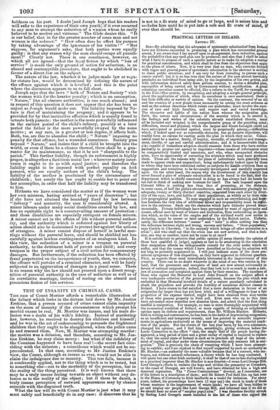TEST OF INSANITY IN CRIMINAL CASES.
Tax case of Count Mortier affords a remarkable illustration of the fallacy which lurks in the dictum laid down by Mr. Justice Erskine, that a person accused of crime cannot claim impunity on the score of insanity if the circumstances which prompt his morbid excess be real. M. Mortier was insane, and his main de- lusion was a doubt of his wife's fidelity. Instead of murdering her, however, he resolved to destroy his children and himself; and he was in the act of endeavouring to persuade the frightened children that they ought to be slaughtered, when the police came in and rescued them. Now, M. Monier was attempting murder: the motive was a delusion, and therefore, according to Mr. Jus- tice Erskine, he may claim mercy : but what if the infidelity of the Countess happened to have been real 4—the secret fact coin- ciding with the delusion ; a coincidence which would not be un- precedented. In that case, according to Mr. Justice Erskine's view, the Count, although as insane as ever, would not be able to claim the indulgence due to insanity. This test fails, because it is confessedly applied, not to the thing which is to be tested, but to something else—not to the morbidity of the perception, but to the reality of the thing perceived. It is well known that there may be a truly insane feeling towards an object without any de- lusion as to the reality of the object ; but if there be deceit, a truly insane perception of outward appearances may by chance coincide with the disguised truth.
What the law will do with Count Mortier is just what it may most safely and beneficially do in any case: it discovers that he is not in a fit state of mind to go at large, and it seizes him and secludes him until he is put into a safe and fit state of mind, if ever that should be.


























 Previous page
Previous page